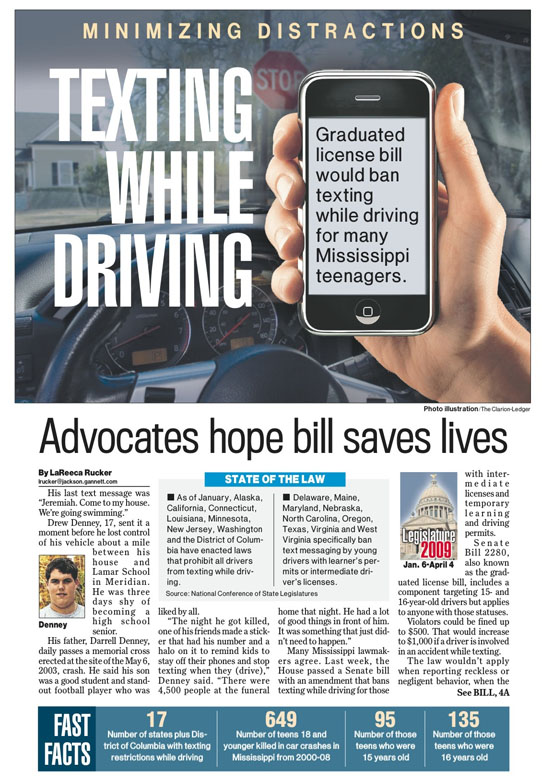Response mixed to Mississippi texting while driving bill
LaReeca Rucker
The Clarion-Ledger
His last text message was "Jeremiah. Come to my house. We're going swimming."
Drew Denney, 17, sent it a moment before he lost control of his vehicle about a mile between his house and Lamar School in Meridian. He was three days shy of becoming a high school senior.
His father, Darrell Denney, daily passes a memorial cross erected at the site of the May 6, 2003, crash. He said his son was a good student and standout football player who was liked by all.
"The night he got killed, one of his friends made a sticker that had his number and a halo on it to remind kids to stay off their phones and stop texting when they (drive)," Denney said. "There were 4,500 people at the funeral home that night. He had a lot of good things in front of him. It was something that just didn't need to happen."
Many Mississippi lawmakers agree. Last week, the House passed a Senate bill with an amendment that bans texting while driving for those with intermediate licenses and temporary learning and driving permits. Senate Bill 2280, also known as the Graduated License Bill, includes a component targeting 15- and 16-year-old drivers, but applies to anyone with those statuses.
Violators could be fined up to $500. That would increase to $1,000 if a driver is involved in an accident while texting. The law wouldn't apply when reporting reckless or negligent behavior, when the sole occupant of a car believes he is in danger, when the car is parked or when communicating during emergency situations.
An effort to defeat the ban failed by 10 votes in the 122-member House. It still needs Senate approval of the amended version.
Texting while driving is not something to "LOL" about. While many believe the proposed legislation may save lives, others believe it's an example of government overregulation.
Darrell Denney cautions others about texting while driving, calling it "as dangerous as a cocked gun," but he doesn't believe government involvement is the answer.
"I'm very anti-regulation," he said. "I was against drug testing in the schools, too. You can warn them and beat them with sticks, but it's one of those things you cannot stop. It's unenforceable. You have to punish them when they do it, but as far as having a law to make it stop, I think it's useless."
Lynn Evans, a legislative monitor with the state chapter of the American Academy of Pediatrics, helped get the amendment added. She said her group believes it will improve teen highway safety in the state.
She said from 2000 to 2008, 649 teens 18 and younger were killed in car crashes in Mississippi. Of those, 95 were 15-year-olds and 135 were 16. Vehicle crashes are the top cause of child deaths in Mississippi.
"We have been working to reduce teen traffic fatalities for over six years," she said. "A lot of the emphasis for this started because, in July of 2007, five high school girls died in a very bad automobile accident on the day of their graduation. Law enforcement at the scene said, from everything they could see, the driver was texting when she crashed."
It happened in western New York. Similar to the Denney accident, another 17-year-old sent a text message to a friend a moment before her vehicle crashed. Four passengers also were killed.
To those who oppose the legislation, Evans says, "Driving is a privilege, not a right."
"There are lots of new studies that indicate teens don't think like the rest of us," she said. "They are more likely to take risks, and that's one reason they are more likely to have an accident on the highway. We really believe a year and half of not being able to text in your car is a small thing to give up for everybody being safer on the highway."
The legislation also adds six months to the length of time teens must wait before they receive driver's licenses. Supporters say they hope adding six months allows younger drivers to mature and results in fewer accidents.
Evans said her group worked with other legislators, including House Transportation Committee Chairman Rep. Warner McBride.
"We thought we would start with the most basic things we could start with - banning texting while driving for 15- and 16-year-olds," McBride, D-Courtland, said. "I think this will be a fair experiment for our society. We are trying to deal with the issue and save lives."
Rep. Sam C. Mims V, R-McComb, sees the proposed legislation differently. He said teens shouldn't text while driving, but he doesn't believe it's the government's responsibility to enforce.
"As a father of three small children, I do understand the importance of keeping our children safe," he said, "but I believe this goes too far. I believe it is my role as the father and my wife's role as the mother to teach our children what is right and wrong and what is safe and unsafe. I don't believe that's the role of state government. My father once told me that if I got caught driving without my seat belt, my keys become his."
Lt. John Neal, head of the Ridgeland Police Department Patrol Division, said enforcing the law would require exacting observation.
"It would take some time to observe the driver sending a text while they were in motion driving down a public street or highway," he said. "They would have to have one hand off the steering wheel that would draw the officer's attention."
Neal said police frequently notice drivers sending text messages, but so far, it hasn't been a big problem in Ridgeland.
"I'm sure as it becomes more mainstream, people will be more comfortable doing it unless there's something out there to keep the roads safer for these inexperienced drivers," he said.
Right now, Neal said it's comparable to other things people do in their vehicles.
"I've passed them on I-55 where they have a books propped up, reading," he said. "They are driving perfectly normal, but that with other acts could constitute careless or reckless driving."
Eddie Lofton, head baseball coach and driver's education instructor at Clinton High School, frequently sees students texting while driving.
"When we're out on duty in the morning, we sometimes see kids driving into school looking down. We know they're either text messaging or talking on their cell phone," Lofton said.
He often warns student drivers about it. "We watch a video about accidents it has and could cause," said Lofton, who believes there should be some legislation prohibiting it but isn't sure what form it should take.
Gabe King, one of Lofton's students, has had his license about three months.
"Every time I get in the car with someone, teenagers are always texting everybody and not paying attention to the road," said the 17-year-old, who admits he's done it in the past. He supports legislation but doesn't think it should target teens alone.
"It should be for everybody," he said. "Adults can get in accidents just like 15- and 16-year-olds."
Marc Herrington, the driver's education teacher and athletic director at Pisgah High School, agrees.
"I've seen people reading papers and putting on makeup while driving," he said. "I have students who don't even pay attention to road signs. I know some people say it takes away from their liberties, but when you put my family at risk because you are not paying attention behind the wheel, that's a problem."


